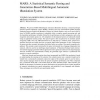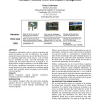2047 search results - page 13 / 410 » The limits of speech recognition |
ICONIP
2004
13 years 10 months ago
2004
In-Car speech recognition will be pervasive over the coming years. The goal of speech enhancement is to increase the quality and intelligibility of speech in a noisy environment. T...
MT
2002
13 years 8 months ago
2002
We present MARS (Multilingual Automatic tRanslation System), a research prototype speech-to-speech translation system. MARS is aimed at two-way conversational spoken language trans...
SPEECH
2002
13 years 8 months ago
2002
Automatic speech recognition of real-live broadcast news (BN) data (Hub-4) has become a challenging research topic in recent years. This paper summarizes our key efforts to build ...
CHI
2002
ACM
14 years 9 months ago
2002
ACM
Recognition technologies such as speech recognition and optical recognition are still, by themselves. not reliable enough for many practical uses in user interfaces However, by co...
ICASSP
2009
IEEE
14 years 3 months ago
2009
IEEE
Maximum-Likelihod Linear Regression (MLLR) transform coefficients have shown to be useful features for text-independent speaker recognition systems. These use MLLR coefficients ...


